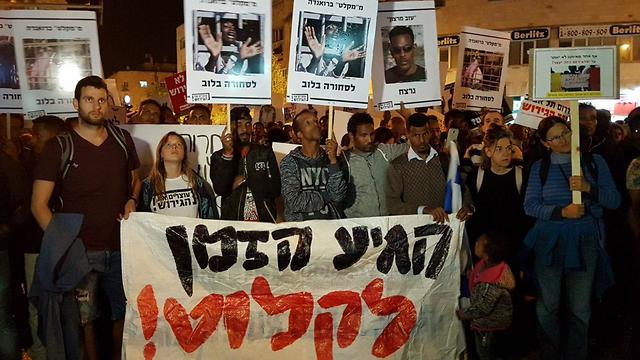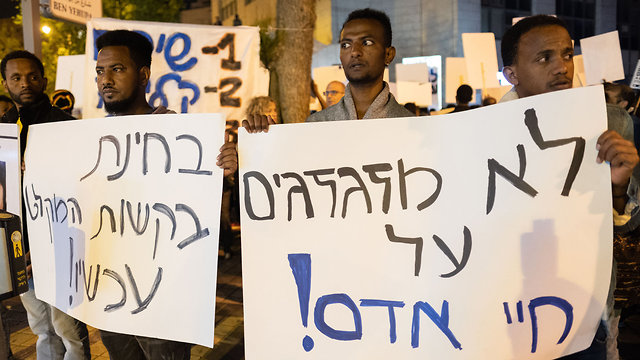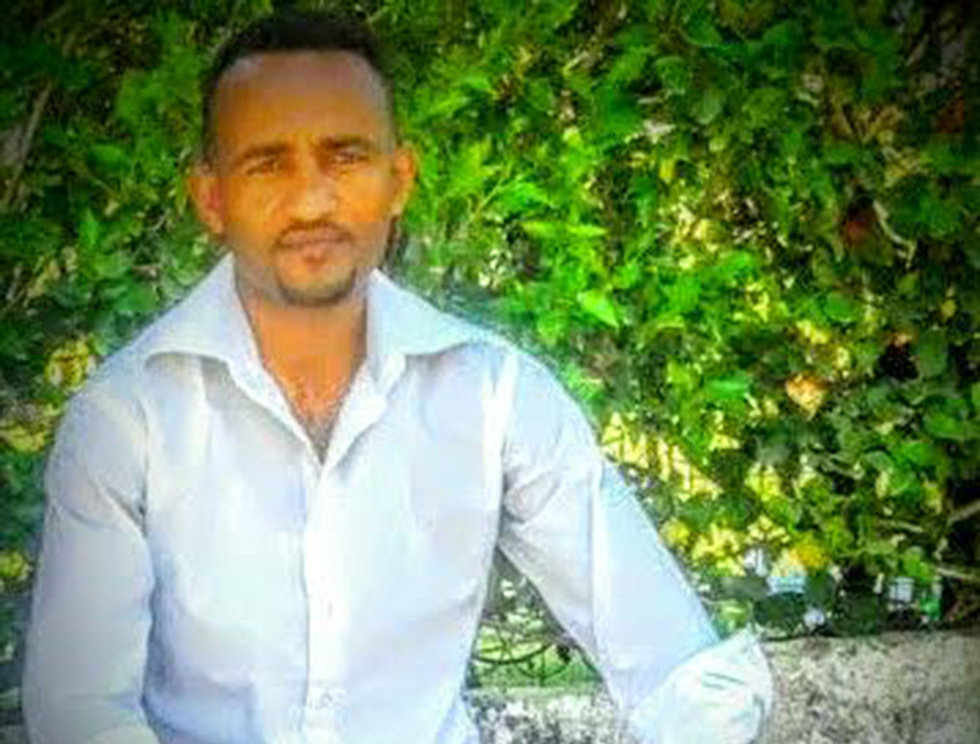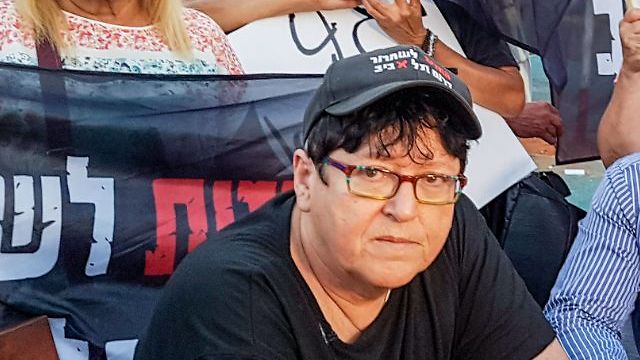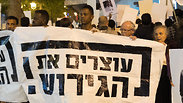
Anti-deportation demonstration
Photo: Yoav Dudkevitch

African migrants celebrate nixing of deportation plan
After state announces no more deportation orders in the offing, human rights groups and African asylum seekers rejoice as accompanying 'life-threatening dangers' are averted; government officials say Israel now seeking other African countries to take migrants, but angered south Tel Aviv residents say ‘we no longer believe in promises and fairytales.’
African asylum seekers who were marked for deportation from Israel are celebrating as a life-saving moment the state’s announcement
on Tuesday that it would refrain from issuing further expulsion orders to Eritrean and Sudanese migrants, and that all orders already served will be rescinded.
The migrants and their Israeli support groups are hailing the decision, despite government efforts to ensure that it is temporary and to find a new solution that would entail the illegal migrants’ mass deportation.
Despite Prime Minister Benjamin Netanyahu and Interior Minister Aryeh Deri’s subsequent announcements that immediate preparations for the reopening of detention facilities will commence in light of Uganda and Rwanda's refusal to take in the migrants under the terms Israel demanded, joy still prevailed among the people who for weeks were slated for deportation.
Halfum Sultan, a 37-year-old Eritrean asylum seeker who was set to be deported, told Ynet that “our lives have been saved.”
Netanyahu and Deri also announced they will begin promoting the override power to set the stage for the facilities' operation, alongside other measures to be taken to solve the problem.
With Rwanda and Uganda backing out of the deal last minute for absorbing the migrants, Jerusalem has also begun making contact with two other African countries in a bid to reach a similar agreement.
Associates close to Netanyahu have said that they believe there is a reasonable chance that the two new countries will agree.
“We want to thank the citizens of Israel who helped us get to this moment in which the deportation, which was an immediate danger to our lives, was canceled,” Sultan said with relief.
“Now I really hope that they will spread us around the country and that our lives here will improve. That will help both us, and the neighborhoods of south Tel Aviv, for whom I also hope there is a solution. We will also continue to pray for the situation in the countries we came from to get better so we can return to them,” he continued.
Sultan also said that he believes the government will continue in it attempts to breath new life into a deportation program, but does not believe that it will succeed.
“I don’t think there is a country in Africa which will agree. There is no state that can take us in better than Israel, because some of the countries are themselves the sources of the refugees and some already took in many refugees,” he explained.
Attorney Itay Mack, who submitted petitions to the High Court of Justice on behalf of 119 human rights activists which led efforts to bring about the cancelation of the deportation program, praised the human rights groups for their role in stopping the state in its tracks.
“It is frightening that without demands by human rights organizations and our warning about this contemptible behavior, the state would have continued as usual to carry out forced deportations, by exerting illegal pressure and issuing false deportation decrees,” Mack said.
After attacking Netanyahu for his efforts to deport the migrants, a representative from one of the rights groups praised the African countries that refused to take part in the plan, while lamenting the fact that the crisis demanded court intervention to make Israel abandon its controversial policy.
Echoing the sentiments of Sultan, a representative from the pro-migrant “Stop the deportation” group said that no “third state” existed that would agree to act as a partner in Israel’s mass expulsions.
“There is no third country and there won’t be a third country. The sandstorm in the public’s eyes has to stop. Every shekel that is wasted on the incitement campaign which sows hatred is a shekel that should be invested in absorption and moving the asylum seeker population (around the country),” the representative said.
Shula Keshet, one of the leaders of the South Tel Aviv Against the Expulsion group, described the state’s cancelation of the deportation plan as “a happy day for Israeli democracy.”
“Now is the time to deal with the crisis responsibly and to begin a serious plan for distributing the refugees and asylum seekers throughout the country, including to established locatilites,” Keshet urged.
For activists fighting for the deportation plan, however, the state’s latest announcement and retreat from the plan represents a betrayal of south Tel Aviv, where the majority of the migrants live.
“The government of Israel betrayed the residents of the south Tel Aviv neighborhood,” vented Sheffi Paz, who leads the South Tel Aviv Liberation Front. “We no longer believe in any promise, only real action. Don’t tempt us anymore with fairytales. Today, more than ever, we know everything depends on us and only us.”
Paz’s comments came weeks after she held a meeting, together with anti-migrant activists, with Netanyahu after he outraged supporters of the deportation policy by announcing an unexpected decision that he was replacing the plans to deport the migrants with a deal struck with the United Nations, according to which the latter would work to reach agreements with different Western countries to take in at least 16,250 of the Sudanese and Eritrean asylum seekers.
At the opening of the two-hour meeting in the Kirya IDF headquarters with the angry residents, Netanyahu informed them that he had once again reversed his position and had decided not only to suspend the UN deal, but annul it altogether.














